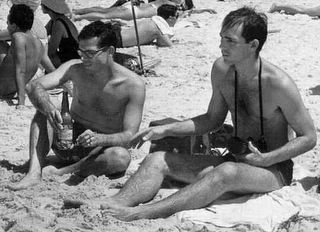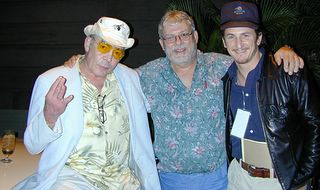
Bob Bone and Hunter, Rio, 1963

Hunter, Bob Bone, Sean Penn, Honolulu 2001
Bob Bone is a newspaper journalist, magazine columnist, and guidebook author who lives in Hawaii and is a fellow member of the Society of American Travel Writers. He's also an old friend of Hunter S. Thompson, and today he posted a most heartfelt and revealing profile of his early days with Hunter, which I have posted here with his permission.
The writer is the Faust of modern society, the only surviving individualist in a mass age. To his orthodox contemporaries he seems a semi-madman. -- Boris Pasternak
I was shocked -- but not surprised -- to hear of Hunter's death. It was completely consistent with his approach to life.
During the 1960s, when Thompson and I were first trying to make an indelible mark on the world at large, if I had said to him, "Hunter, you're going to kill yourself some day," I'll bet he would have puffed on his pipe, nodded and thoughtfully agreed that it was indeed not outside the realm of possibility.
When we first met, in 1958 while we were on the staff of the Middletown, (N.Y.) Daily Record (now the Times-Herald Record), Hunter revered and frequently quoted Ernest Hemingway. If his life were to have any parallels to that of the great author, he would certainly have approved. Hemingway, of course, was obsessed with death and subsequently took his own life with a gun in 1961.
But Hunter, who pretended much of the time to be angry or incensed at the effronteries and absurdities with which he was frequently confronted, was also fun-loving in his own way. He set up amusing situations -- usually ones which embarrassed those of lesser intellect, but fascinated and delighted others. He often related stories of his conflicts with his superiors in the air force. One later account, which involved himself and a friend getting in a fight in a New York bar, had as its central theme the fact that they both just happened to be carrying bags of flour or cement (I forget which). Of course the bags eventually broke causing havoc on the premises, at the same time that it obscured their escape.
In those days of his relative obscurity, he was often a character of apparent annoyance, but enjoyable enough to be suffered by his friends in spite of it. He was usually broke, but he carried printed personalized checks from an expired bank account in his pocket. If you asked him if could now pay back the 20 bucks you lent him last week, he would reply with a sardonic smile and say, "Of course. I can give you a check!"
I always turned down those worthless checks, but I wish now I had not.
Hunter didn't last long at the Middletown Record. He was already skating on thin ice since he refused to wear shoes while in the news room. But one day, he had an argument with a candy machine. When Hunter lost his two nickels without receiving his due reward, he beat the machine savagely until it disgorged all of its contents. Hunter strolled away carrying only the candy bar that he had paid for. But management soon discovered that everyone in the newsroom and the back shop all were eating candy bars, and so Hunter was discharged. It was certainly just the outcome that he wanted.
Hunter followed me to Puerto Rico. I worked on the first staff of the San Juan Star, a new English-language daily. Hunter worked briefly for an ill-fated local sports magazine. The Star knew better than to hire him, but its managing editor, William Kennedy, and Hunter began a life-long friendship. Kennedy later went on to fame as the author of Ironweed and other novels. In Puerto Rico, Hunter lived in a small community which he claimed was the haunt of witch doctors and other practitioners of voodoo. There he wrote his first novel, the Rum Diary, which ironically was not published until 1998 -- long after his later successes.
The early-60s found us both in Manhattan. Many of our small group of wannabes were at various times resident of a single modest tenement apartment in Greenwich Village. The official tenant was Sandy Conklin, who later became Hunter's first wife. We made beer in the kitchen, and most of us tried to write, with greater or lesser degrees of success. I still have tape recordings of some of our conversations. In 1961, Hunter left for South America. His letters to me contained words and terms which are now famous -- his "gonzo" approach to journalism and to life.
In 1962, I left my job at Popular Photography to edit a small business magazine in Brazil. A few months later, Hunter showed up on Copacabana Beach. I spotted him while riding in a convertible with a friend, and we stopped to let him in the car. He had a drunk monkey in his jacket pocket. His explanation was that he met someone in a bar who would buy him a drink only if he could buy the monkey a drink at the same time. The monkey eventually committed suicide, leaping into the air from the balcony of my tenth-floor apartment -- we presumed a victim of the DTs.
Back in his hotel room Hunter also had a coatamundi, a small furry animal that he said he had rescued from some who were mistreating it in Bolivia. The coatimundi distinguished itself by eventually becoming toilet trained. It also liked to play with soap, thus apparently washing its hands. Hunter named it "Ace."
We had several adventures together in Brazil before we both left within a few months of each other in 1963, Hunter to California and I back to the same traditional Village apartment in New York, and I began working for the New York Post and then for Time-Life. We had considerable correspondence during that period, and occasional meetings on both the West and East coasts. We sought advice from each other on the crises that young men have, but I suppose we seldom followed any of our words of wisdom. I still have many of these letters, whose acerbic terminology presaged those of his later public persona. I even have a Hunter Thompson cartoon which he drew. It's still pinned on the wall above my computer in Hawaii. Not many knew that Hunter could draw a little, too.
After Hunter's first major literary success, his saga on the Hells Angels motorcycle gang, we seldom saw each other again. I married, had a child, and moved to Spain. He promised to follow me, but never did. Hunter married Sandy, and he also had a child, and he moved to Woody Creek, Colorado. He began moving in circles vastly different than my own, although we never completely lost touch. My family and I moved here to Hawaii in 1971, where I began writing a series of travel guidebooks. But if my phone rang in the middle of the night over the past 34 years, it was most likely Hunter.
Every now and then, a mutual acquaintance would mention my name to Hunter. He almost invariably mumbled something like, "Ah, yes. Bone. A good man, Bone." Actually, he regarded me as somewhat intellectually challenged in comparison to himself, and I'm sure he was right.
We last met in person when he came in 2001 to cover the Honolulu Marathon for ESPN.com. It was not entirely a satisfactory meeting. He seemed not much more than a shell of the vigorous and vital friend that I knew nearly a half-century ago. Hunter's body had been taking a beating from his lifestyle for a long time, and I asked him if he realized that he could hardly sit down without slightly rocking back and forth for several minutes afterward. Nevertheless, I felt encouraged by the fact that he still seemed to be hanging in there in spite of it all.
I was never one of Hunter's legions of fans, but I was proud to be one of his good friends, blessed with shared and very fond memories of some of the best days of our lives. I will miss him and his 3 a.m. phone calls.
Robert Bone Travel Writer
No comments:
Post a Comment